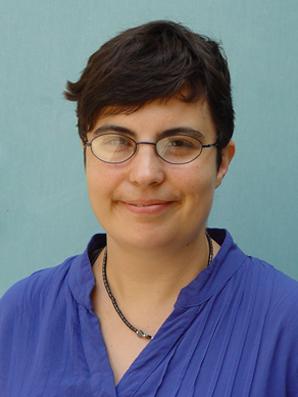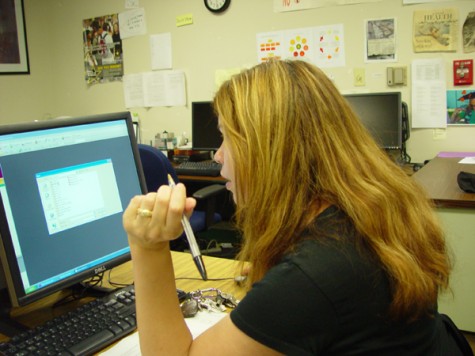Author Sonia Nazario spoke in the auditorium about her book “Enrique’s Journey” on Thursday, wrapping up a series of lectures centered on immigration and her Pulitzer Prize-winning book.
The lecture highlighted sections in the book and updated some of the material.
“I’m thrilled to be here in Glendale talking about this issue, which is obviously a huge issue here in Glendale,” the author said. “We’re seeing the biggest crackdown on the undocumented for illegal immigration here in the U.S. As I’ve traveled the country I’ve seen some amazing things in Arizona.”
Nazario said that employers caught a second time with undocumented workers would have their business license removed.
There has been more than 1,100 pieces of legislation on the state or local level to deal with the issue of immigration and a mounting frustration from people over the federal government’s inability to keep the influx of undocumented people from coming into the country.
According to Nazario, California has the largest population of undocumented immigrants, almost 3 million. Nearly half of California’s children have immigrant parents. In Glendale, 54 percent of people were born in another country.
“So [the number of migrants] it’s really staggering here in Glendale,” said Nazario.
Nazario explained how the idea of the book came to her. Nazario’s housekeeper, Carmen, told her about leaving her four children behind in Guatemala, so she could come to the United States to earn money, which she sent back to them to pay for their food and school expenses.
Her story, not unlike the millions of people from Mexico or Central America, who come to the United States to seek a better way to support their children, was what inspired Nazario to put a human face on immigration.
Nazario documents Enrique, whose mother leaves him and his sister at a very early age to escape the grinding poverty of Honduras and provide a better life for her children.
Enrique is one of hundreds of thousands of children who travel to the United States to be reunited with their parents or to flee abusive relatives. His story documents his dangerous travels on the tops of trains and his attempts to reach America and his family, as well as stories of other migrants.
The dangers of the journey included corrupt police, who beat and rob migrants before sending them back to central America; bandits and gangsters; and the dangerous train itself that can tear limbs off or kill those who fall or are pushed off.
Nazario experienced some of the journey first-hand by riding atop trains, interviewing families, other migrants and those who throw food or give aid to migrants and even facing some of the dangers of the journey.
Nazario recounted her first train ride.
“It was pitch dark,” said Nazario, “maybe 100 or 120 people atop this train – migrants and the ones nearest the locomotive started yelling back a warning and they were screaming out ‘Rama!’ (branch), but the train is blisteringly loud. I mean – incredibly loud, and I couldn’t hear what they were saying.
“I was holding on with both hands because the tracks are so lousy that the train bucks from side to side and if you don’t hold on with both hands, you’re not going to stay on the train. But I didn’t hear the warning and this huge branch hit me square in the face and it sent me sprawling almost off that train.”
An encounter with a migrant, who harassed her in the south of Mexico atop the train, had her running to the conductor for help and into therapy afterward. She joked that her husband, Bill, forbade her riding on top of the trains, and said she wouldn’t have to worry about gangsters if she rode because he would kill her first.
She said she stopped riding on top of the trains after that.
With the protection of Grupo Beta Sur, a migrants’ rights group, and what she calls “the Golden Letter,” written by the assistant to the president of Mexico that kept her out of jail three times, Nazario followed in the footsteps of Enrique.
Sometimes she even interviewed Enrique during his failed attempts to make it to U.S. soil.
On the subject of employment Nazario talked of “jobs that Americans won’t do for minimum wage” such as cleaning rooms after suicides had taken place, picking vegetables in 120 degree heat or cutting sugar cane in the swamps of Florida in the humid heat.
“I’m not sure that you’ll get a lot of Americans to do that job (for those wages),” said Nazario.
“The National Research Council, probably one of the best studies to look at the overall effects of illegal immigration, found that immigrants really do drive the economy,” said Nazario. “They add modest, but significant amounts to our $13 trillion economy. They also found that 5 percent of all goods and services for all Americans are cheaper because of immigrant labor, and so that means that all of you can afford childcare, getting your lawn mowed, getting your car washed, clothing.all of which are cheaper because of immigrant labor.”
She said she thinks many businesses, including meat packing plants, would have to close up shop or outsource if they had to pay twice as much for wages.
In the question and answer period, Nazario gave updates on Enrique, and said he had gotten back into drugs, but that she was looking for rehab centers that he could go to. She wouldn’t comment about the daughter, Jasmin, who was left behind, other than she was doing well.
To further inform the audience on what happens to children once they are caught in the United States, Nazario said that the children are taken to separate shelters instead of detention centers with adult immigrants.
About the political implications of the immigration, Nazario said, “the immigration issue has been submerged for sometime here as the presidential candidates have done everything in their power not to talk about it, because they don’t want to stir that pot. Historically, as the economy tanks, the ‘scapegoating’ of immigrants increases. So I’m guessing that we’re going to see this go from a simmer to a boil in the coming months.”
Religion had a part in her writings, as she told the audience about the people who were helping the migrants and said they were “living their faith.”
Nazario said she has left the Los Angeles Times and is working on a new book about the lives of five women and social issues.
A version of “Enrique’s Journey,” or “La Traversia de Enrique,” is also available in Spanish.
A book signing followed the lecture.
For more information on Enrique’s Journey visit http://www.enriquesjourney.com.


